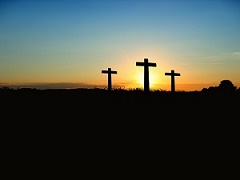Easter is still not derived from pagans (Second Letter to Editor)
This is the second letter to the editor on the subject of a claim that Easter is derived from ancient Nineveh goddess.
The News Observer
Appalachian Highway
Blue Ridge,
Georgia
May 26, 2017
Reference: Council of Nicea did no favors for body of Christ (May 10, 2017 Issue)
Dear Editor:
The following is submitted for Letters to the Editor.
Easter is still not derived from pagans
Mr. Towe’s follow up letter “Council of Nicea did no favors for body of Christ “ certainly was interesting but the portrayal of the origin of the celebration of Easter needs clarification.
My comment “Beginning with the Council of Nicea …” in a previous letter was not an anchor, it was just a statement of historical fact. From that date the celebration of the Resurrection (called Easter in English) has been on the Sunday following the first full moon after the spring equinox – first in the Julian calendar and later in both the Gregorian and Julian calendars.
The Council of Nicea did NOT originate the Sunday celebration. The Council of Nicea only served as a forum for close to 300 Bishops (Pastors) of early churches to come to a common agreement. The celebration on Sunday and a celebration based upon the 14th day of Nissan (day of week independent) had been competing since the Resurrection of Jesus. This and another issue about the Divinity of Jesus were the main disagreements that the Council of Nicea made an effort to settle. However both methods of celebrating the Resurrection predated the council and are documented in extant writings of the time period. One example follows (italics added).
From (Eusebius Pamphilius: Church History Chapter
XXIII):
A question of
no small importance arose at that time. For the parishes of all Asia, as
from an older tradition, held that the fourteenth day of the moon, on which
day the Jews were commanded to sacrifice the lamb, should be observed as the
feast of the Saviour’s Passover. It
was therefore necessary to end their fast on that day, whatever day of the
week it should happen to be. But it was not the custom of the churches in
the rest of the world to end it at this time, as they observed the practice
which, from apostolic tradition, has prevailed to the present time, of
terminating the fast on no other day than on that of the resurrection of our
Saviour.
There are also extant writings from the time period of Emperor Hadrian that show the two forms of celebration of the Resurrection already in place in 135 AD. Hadrian was the emperor who first outlawed Jewish practices following the Bar Kokhb revolt, not Constantine.
Mr. Towe’s letter references the disputed writings of Hyslop who partially bases his mythology on the pronunciation of “Easter” in English and the cuneiform language of Nineveh. Quoting Hyslop from Mr. Towe’s letter “… the queen of heaven, whose name, as pronounced by the people of Nineveh, was evidently identical with that now in common use in this country.”
No one at the Council of Nicea spoke English. No one in the first or second century churches spoke English. English, even the early Anglo-Saxon versions were still centuries in the future. The Druids were Celts and spoke early forms of Gaelic or a Druid dialect, not English. The possible pronunciation of the name of the Nineveh fictional woman was not a factor.
A closer look at the origin of the word “Easter”. The Frankish church (Germans who settled in Rome during the fifth century) celebration of Christ's resurrection used the Latin word alba. Alba also meant sunrise. So when the name of the festival was translated into German, the sunrise meaning, ostern, was selected. This became the Old English word ester and later the “a” was added. Thus the word Easter has Germanic roots. You can see this progression in the early translations of Acts 12:4.
Luther—Da er ihn nun griff, legte er ihn ins Gefängnis und überantwortete ihn vier Rotten, je von vier Kriegsknechten, ihn zu bewahren, und gedachte, ihn nach Oster dem Volk vorzustellen.
Tyndale—And when he had caught him he put him in preson and delyvered him to .iiii. quaternios of soudiers to be kepte entendynge after ester to brynge him forth to the people.
KJV—And when he had apprehended him, he put him in prison, and delivered him to four quaternions of soldiers to keep him; intending after Easter to bring him forth to the people.
The 1828 Webster’s Dictionary has the following definition of Easter:
A festival of the christian church observed in commemoration of our Savior's resurrection. It answers to the pascha or passover of the Hebrews, and most nations still give it this name, pascha, pask, paque.
The current Merrian-Webster online dictionary:
a feast that commemorates Christ's resurrection and is observed with variations of date due to different calendars on the first Sunday after the paschal full moon
So claims that Easter is of pagan origin are false. Easter has always been a day to celebrate and remember the sacrifice on the Cross and the Resurrection of Jesus Christ which offers all of us the glorious hope of salvation. If you do not have this hope today, every Sunday service is a celebration of the Resurrection of Jesus. Come visit one of His churches.
Respectfully submitted,
Mike Crane
eMail: mikecrane@tds.net

